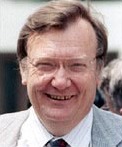Carlo Rubbia
Carlo Rubbia (born March 31, 1934 in Gorizia ) is an Italian physicist specializing in experimental particle physics. In 1984 Rubbia received the Nobel Prize in Physics together with Simon van der Meer “for their significant contributions to the large project that led to the discovery of the field particles W and Z , mediators of weak interactions ”.
In 1976 he had the then bold idea of converting the proton accelerator SPS at CERN into a proton-antiproton collider, which should provide the necessary center of gravity energies for the direct detection of heavy vector bosons (W, Z bosons). Under his direction, the UA1 detector was set up at CERN for this purpose, which was used to detect the W boson in 1983. In doing so, he built himself a reputation as a forward-looking physicist and successful science organizer with great assertiveness. From 1989 to 1993 he was Director General of CERN.
Rubbia studied physics at the University of Pisa and the Scuola Normale Superiore in Pisa, graduating in 1957 from Marcello Conversi with a thesis on experimental research on cosmic rays and the Laureate degree from the University of Pisa in 1958. He was a post-doctoral student at Columbia University , where he researched muon decay and capture in nuclei. From 1960 he was at CERN , where he also dealt with experiments on weak interaction at the ISR . Among them were early experiments in the early 1970s to discover baryons with charm. On the other hand, he was involved in the EA1 experiment at Fermilab in 1972/73 , which was in sharp competition with CERN's Gargamelle and discovered weak neutral currents at about the same time (but published a little later).
During his time as President of the Italian National Agency for New Technologies, Energy and the Environment, ENEA, from 1999 to 2005, Rubbia worked on the Archimedes project to improve solar thermal power plants . He also came up with the concept of the Rubbiatron for an accelerator-driven nuclear reactor , which he sees as an inherently safe type of reactor.
From 2006 to 2009 Rubbia was Chief Scientific Advisor at the Spanish Research Center for Energy, Environment and Technology, CIEMAT. In 2009 he became Special Advisor on Energy to the Secretary General of the UN Economic Commission for Latin America and the Caribbean , ECLAC.
From June 2010 to May 2015 Rubbia was Scientific Director at the Institute for Advanced Sustainability Studies (IASS e.V.) in Potsdam and is now an Honorary Senior Fellow there .
On August 30, 2013 Carlo Rubbia was appointed Senator for life by President Giorgio Napolitano . He is a member of the Accademia Nazionale delle Scienze . In 1975 he was elected to the American Academy of Arts and Sciences . He is a member of the Accademia Nazionale dei Lincei and since 1987 a member (Foreign Associate) of the National Academy of Sciences . Since 2001 he has been an honorary member of the Austrian Academy of Sciences . In 2004 he received an honorary doctorate from RWTH Aachen University .
Documents
- 1991 - Faces of Switzerland by Nicolas Gessner a . a. Documentary film for the 700th anniversary celebration of the Swiss Confederation . Episode: Carlo Rubbia
Web links
- Information from the Nobel Foundation on the awarding of the 1984 prize to Carlo Rubbia
- Literature by and about Carlo Rubbia in the catalog of the German National Library
- Portrait of Carlo Rubbia in the NZZ Folio magazine
Individual evidence
- ^ A b Carlo Rubbia on the IASS website
- ↑ CIEMATs VÉRTICES magazine, No. 1, Nov. 2006, p. 4 (PDF, 3,493 kB)
- ↑ CIEMAT homepage
- ↑ ECLAC press release ( page no longer available , search in web archives ) Info: The link was automatically marked as defective. Please check the link according to the instructions and then remove this notice. (English), accessed March 24, 2012
- ^ Napolitano nomina quattro senatori a vita. La Repubblica , August 30, 2013, accessed August 30, 2013 .
| personal data | |
|---|---|
| SURNAME | Rubbia, Carlo |
| BRIEF DESCRIPTION | Italian physicist |
| DATE OF BIRTH | March 31, 1934 |
| PLACE OF BIRTH | Gorizia |

